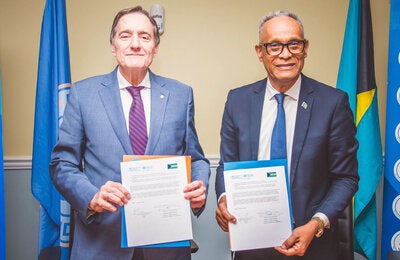

The Pan American Health Organization/World Health Organization (PAHO/WHO) is calling for renewed commitment from all sectors of society to create supportive environments for breastfeeding, including in worksites, parks, public transportation, health services and other places outside the home where mothers of young children carry out their daily lives. The call for action comes at the start of World Breastfeeding Week 2011.
Washington, D.C., 1 August 2011 (PAHO) —The Pan American Health Organization/World Health Organization (PAHO/WHO) is calling for renewed commitment from all sectors of society to create supportive environments for breastfeeding, including in worksites, parks, public transportation, health services and other places outside the home where mothers of young children carry out their daily lives. The call for action comes at the start of World Breastfeeding Week 2011.
{slideshow}122,300,199,r{/slideshow} To highlight the many settings where breastfeeding needs to be supported, PAHO's 2010 Public Health Champion, Fernando Sendra, has created a series of illustrations using his character "Me, Matias". These illustrations will be used throughout the year in materials on how to ensure breastfeeding-friendly worksites and how to support breastfeeding in public places such as parks and public transportation.
Although breastfeeding has been increasing in many countries in the Americas, much remains to be done to optimize breastfeeding practices. In most countries of the Americas, fewer than half of babies begin breastfeeding within the first hour of life, as recommended by PAHO/WHO. Exclusive breastfeeding for the first six months—also recommended—is low, ranging from 8 percent to 64 percent of babies in different countries of Latin America.
"We need to reverse these trends by creating supportive environments for breastfeeding," said PAHO Director, Dr. Mirta Roses. "Breastfeeding is the safest, healthiest and most natural way to feed a baby, yet breastfeeding tends to be hidden in homes and outside of public view."
The theme of this year's World Breastfeeding Week (August 1-7), "Talk to Me! Breastfeeding—a 3-D experience," is aimed at bringing breastfeeding into the open, to talk about it will all members of society and to show that creating a supportive environment for breastfeeding is everyone's responsibility.
Examples of how to create supportive environments for breastfeeding include: public transportation that offers special seats for breastfeeding mothers and workplaces and public facilities that offer women a place to feed their babies.
Breastfeeding is the single most effective preventive intervention for preventing deaths of children under 5, and research shows that about 20 percent of neonatal (under 1 month) deaths could be prevented if all newborns began breastfeeding during the first hour of life.
In addition, children who are breastfed for seven to nine months have on average six points higher IQ than children who are breastfed for less than a month. Breastfeeding also helps mothers lose weight and reduces their risk of breast and ovarian cancer as well as type 2 diabetes.
Founded in 1902, PAHO is the world's oldest public health organization. It works with all the countries of the Americas to improve the health and quality of life of people in the Region, and its secretariat serves as the World Health Organization's Regional Office for the Americas.
Contact: Dr. Chessa Lutter, Regional Advisor on Food and Nutrition, email: lutterch@paho.org, Tel. +1 202 974 3871, or Sonia Mey-Schmidt, Media and Communication, email: maysonia@paho.org, Tel. +1 202 974 3036, PAHO/WHO — www.paho.org/
Links



